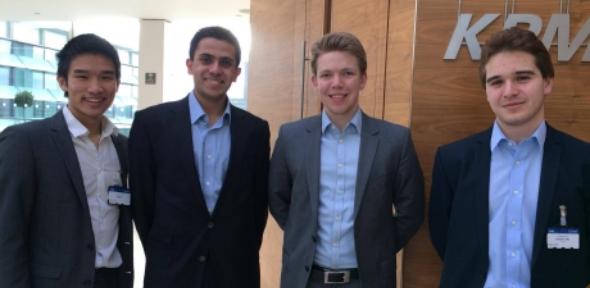
Cambridge team comes second in a major global business competition that features thousands of entrants from all over the world.
The group were one of the few, chosen from 21,000 entries worldwide, who reached the prestigious finals of the KPMG International Case Competition, a consulting contest in which students deal with real-life business challenges.
After several intense rounds in which they were required to work through pages of complex information and produce workable solutions to various business problems, they reached the very last stage – which involved an all-expenses-paid trip to Dubai – before coming second overall.
The team comprised Ravi Prasad and Ian Loo, both of whom are studying Economics at St John’s, Chris Watkins, who is reading Social Anthropology, and their colleague from Trinity College, Dominic Aits.
Run by the Professional Services Company, KPMG, the International Case competition is the biggest challenge of its kind and is aimed at students looking to enter the corporate world. It introduces young people to the competitive world of international business casework.
Each round requires the participants to develop an innovative business solution to a real-world problem in a matter of hours, and then present their recommendations to a panel of experts. Students have to think fast and creatively, and prove that they can operate at the highest level.
The competition began in February, with the UK heats taking place in Birmingham. The Cambridge team’s first challenge was to develop advice for the Qatari government on how to deliver the World Cup in 2020 effectively, during which they came up with an efficient model that used solar energy to power the events. In the next round, they then had to work out how to help a firm in Poland that was engaged in the highly controversial process of fracking for shale gas to make sound investment decisions for the future.
The finals, in Dubai, required them to pit their wits against the national champions from 27 other countries. “The task was basically to develop a strategy for the airline Emirates, and we could take that anywhere we wanted,” Ravi said. “We were given about 30 pages of material to read and three hours to devise our proposals, so it was a pretty high pressure situation.”
The team came up with two suggestions for the airline to improve its business, one which involved teaming up with an internal carrier in the US to break the American market, and the other a proposal for in-flight destination specialists to advise business class travellers on how to get the most out of fleeting visits to foreign countries. The ideas went down so well that they were selected for the very last stage of the contest, and ultimately came second to the eventual winners from Sweden.
Although disappointed not to come first, Ravi described the competition as an unforgettable experience and one that had taught all four members of the team valuable lessons for their future careers. He added that studying at Cambridge had been excellent preparation for the challenges
